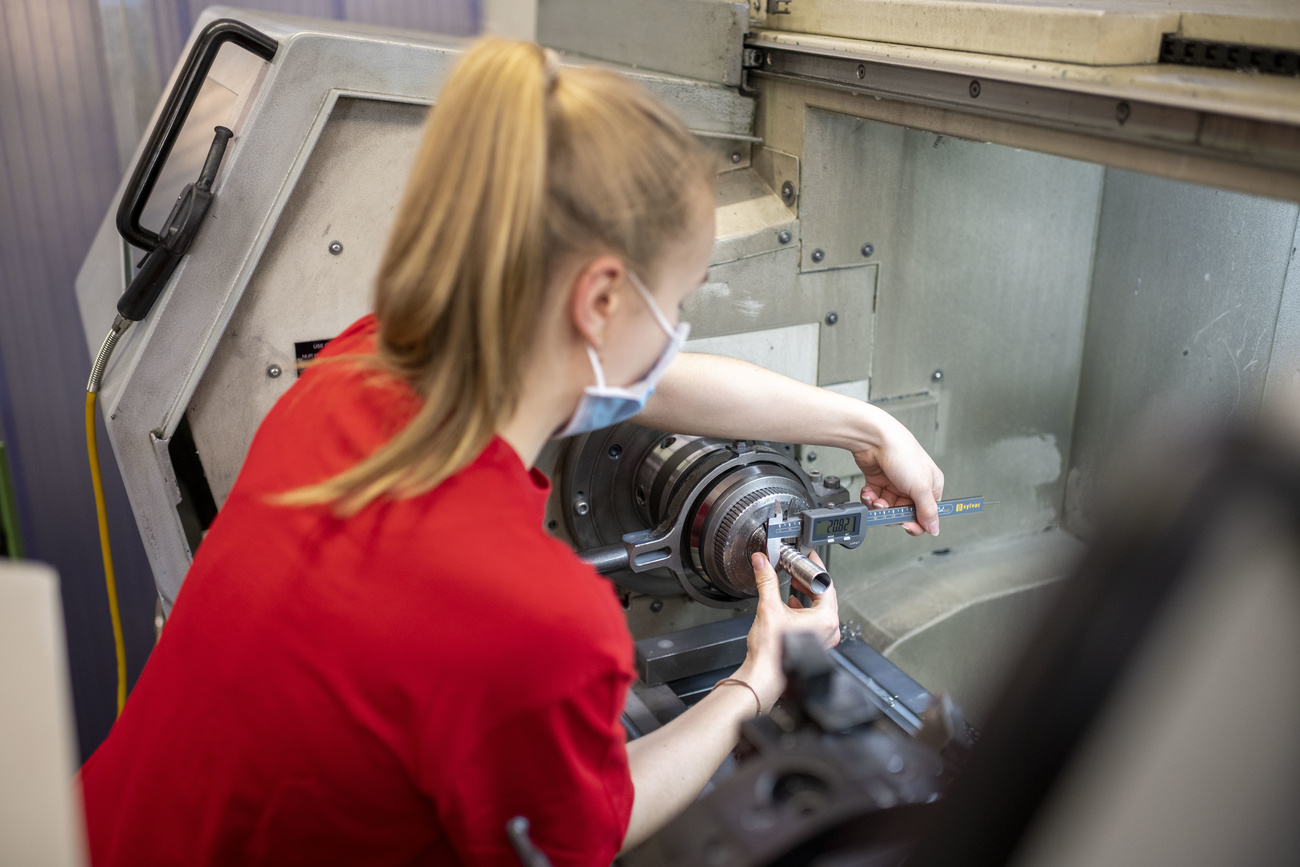
Why the world should take note of the Swiss apprenticeship model
Former apprentices have risen to lead major banks, and even the country. Switzerland’s famed apprenticeship system is often held up as the “gold standard” in vocational training internationally and is the number one choice for school leavers.
Famous figures who have gone through the system include the former CEO of Switzerland’s largest bank UBS, Sergio Ermotti and two current government ministers: Economics Minister Guy Parmelin, who did an agricultural apprenticeship, and Finance Minister Ueli Maurer, started out as a commercial clerk at a farming cooperative.
“It was good for me to go out working at such a young age. During that time I acquired skills and reflexes which have served me well throughout my career and which I still find useful on a daily basis,” Maurer saidExternal link in an interview with the House of Switzerland.
Switzerland’s dual system combines learning on the job – and being paid a learning wage – with one to two days of theory at school. Around two thirds of Swiss pupils opt for an apprenticeship.

More
Apprenticeships in Switzerland
And there are 230 vocational professions to choose from, ranging from catering to high-tech industries.
Vocational and educational training (VET) is considered one of Switzerland’s economic success factors, as it produces a well-qualified workforce and a relatively low youth unemployment rate (an average of 2.5% in 2021).External link
Covid-19 pandemic
At the beginning of the Covid-19 pandemic, however, there were concerns that young people would struggle to find training places. Companies were tightening their belts and the 2020 spring shutdown made it harder for pupils to attend interviews and work placements, two essential components in securing apprenticeships.

More
Are apprenticeships undergoing a ‘corona shock’?
These fears were largely unfounded. “Overall, VET has proven to be crisis-resistant during the Corona period,” concluded a November 2021 reportExternal link, issued to mark the closing down of a special government Covid-19 apprenticeship task force.
But as shown by the Apprenticeship Pulse research projectExternal link, which monitors the effects of the Covid-19 pandemic on apprentices, young people have at times been strongly affected by working from home (not ideal when starting an apprenticeship) and the need to quarantine.
Shortcomings
Even in pre-pandemic times the system has had some challenges. Some parents and students feel that young people are forced to make a career choice too early. How can a young person know what they want to do in life aged 14? they argue. But experts say doing an apprenticeship young offers valuable life experience and there is always the option of changing course later on.

More
Are 14-year-olds ready to make a career choice?
There is also pressure in some quarters – particularly among expats and professionals – for children to go down the academic route for prestige reasons. Currently only around 25% of pupils go on to study at universities.
But the Swiss authorities remain steadfast in their faith in the apprenticeship system and regularly promote its benefits abroad. One avenue is the World Skills “vocational professions Olympics” for young people, where Swiss usually do very well (the 2021 competition was cancelled due to the pandemic).

More
Young Swiss professionals shine at WorldSkills
And there has been international recognition: the often-cited “gold standard” label comes from a 2015 Harvard-backed study that deemed Switzerland top in an international comparative study of vocational education systems.
US interest
The United States in particular has been keen to learn about the Swiss way. In November 2021, Parmelin, then also Swiss president, travelled to Washington in person to renew a memorandum of understanding with the US on vocational training.
As part of previous accords, several US delegations have visited Switzerland to learn more about apprenticeships and several US states have launched initiatives to promote education and training similar to the Swiss model. Swiss companies with US locations have also been spreading the word.
Swiss speciality
In addition, recent apprenticeship data has shown that many people who have started off with an apprenticeship go on to tertiary education. This is very often higher vocational education, a Swiss speciality. It is well established in areas like nursing and IT and allows people to deepen their knowledge and management skills.
It is also possible, via the Federal Vocational Baccalaureate, to get into Universities of Applied Sciences, Switzerland’s more practically oriented universities, if you have done an apprenticeship. An extra exam (passerelle) will get you into an academic university.
But these higher vocational education qualifications are not always recognised abroad, especially in countries where a university education still predominates. There is currently a debate on how best to counter this.

More
Switzerland seeks international recognition for those with vocational skills

In compliance with the JTI standards
More: SWI swissinfo.ch certified by the Journalism Trust Initiative








